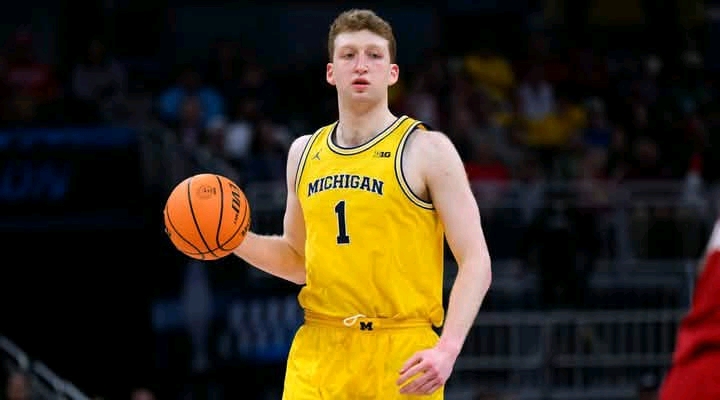Great News: 7-Foot Point Guard Danny Wolf Just Accepted $13 Million Offer to Leave Michigan
In a groundbreaking move that has sent shockwaves through college basketball, 7-foot point guard Danny Wolf has officially accepted a staggering $13 million offer to leave Michigan and join a professional basketball league. The decision marks a significant turning point for Wolf, who has been one of the most highly anticipated players in recent college basketball history due to his unique combination of size, skill, and athleticism.
Wolf, a sophomore at Michigan, has spent the past two seasons dazzling fans with his impressive court vision and ball-handling skills, making him an anomaly in the basketball world. Standing at 7 feet tall, players of his size are typically expected to dominate inside the paint, yet Wolf has proved that he can operate just as effectively on the perimeter. His ability to dribble, pass, and score from almost anywhere on the floor has made him an intriguing prospect for scouts, coaches, and analysts alike.
The Michigan Wolverines had hoped to keep Wolf for at least one more season, as the young star was seen as a centerpiece for the team’s future. However, the offer from a private investor-backed professional basketball league proved too enticing to ignore. The deal, believed to be one of the largest financial commitments to a college athlete in recent memory, will see Wolf leave behind the college game and embark on a professional career far sooner than most anticipated.
The offer, which includes both immediate compensation and a long-term financial structure, is an unprecedented one for a player in Wolf’s situation. Details of the agreement have been kept under wraps, but sources close to the deal say that Wolf will also receive additional incentives based on performance metrics, as well as a significant signing bonus. This move not only signals a shift in the landscape of college basketball but also raises questions about the future of NIL (Name, Image, and Likeness) deals and how they might affect players’ decisions regarding their college careers.
Wolf’s departure from Michigan also signals a new era of professional basketball that is starting to challenge the traditional path of entering the NBA or playing through college. Some experts believe this is just the beginning of a larger trend where elite players are incentivized to leave college early in favor of more lucrative professional opportunities. As NIL deals continue to grow in size and scope, other top-tier players may soon follow suit, opting for the financial security and guaranteed playing time that professional leagues can offer rather than risking injury or stagnation in the NCAA.
For Michigan, the loss of Wolf is undoubtedly a significant blow. The Wolverines had built their future around the young star, who had shown promise not just as a dominant player but as a potential program leader. Head coach Juwan Howard expressed disappointment in Wolf’s decision but wished him well in his professional career. “We respect Danny’s decision and understand that the opportunity before him is a rare one,” Howard said in a statement. “He is a special talent, and we are proud of what he has accomplished with us.”
For Wolf, the decision to leave Michigan and pursue a professional career is both a bold and calculated move. Having already demonstrated his potential as a top-tier player in college basketball, Wolf’s decision to accept the $13 million offer is an indication of his confidence in his abilities and his willingness to take control of his career early.
The news has sparked a wider conversation about the evolving landscape of basketball, with many questioning whether the NCAA’s dominance as the premier platform for player development is waning. As Wolf prepares for the next chapter of his basketball journey, it’s clear that the sports world is on the brink of a new era, one where the traditional model of college sports may no longer be the only path to success.
This move has the potential to shake up the basketball world, as both college programs and professional leagues begin to navigate this new frontier of player development, compensation, and career progression. Whether other players will follow Wolf’s lead remains to be seen, but one thing is clear: the future of basketball is changing in ways no one could have predicted just a few years ago.
